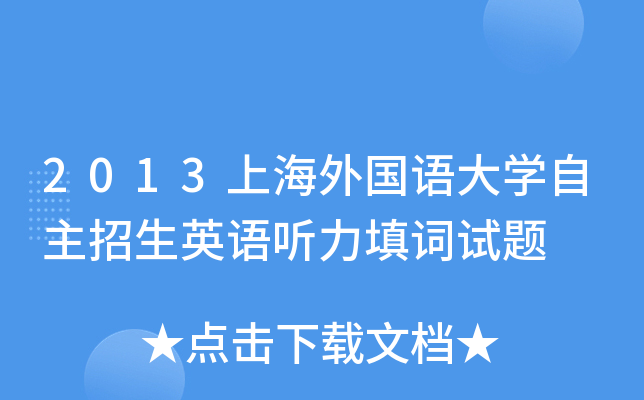:非常感谢e度热心网友陪小树打怪物提供上海外国语大开云kaiyun(中国)自主招生英语听力填词题,整理的非常详细。
June, July and August are vacation months for most American school children. But some young students pay a high price for that long summer break. They may forget much of what they learned over the past year by the time they start the next grade.
6月、7月和8月是大多数美国开云kaiyun(中国)生的假期时间,但有的开云kaiyun(中国)生为了这个夏日长假付出了高昂代价。等到下一年级开始时,他们可能会忘记上一年开云kaiyun(中国)的很多东西。
This problem is often called the summer learning gap. A growing effort across the country aims to deal with it by offering more interesting summer school programs. Some students already attend summer school, but often because they received poor grades during the regular school year.
这个问题通常被称作夏日开云kaiyun(中国)习间隔,美国正在通过提供更有趣的夏日开云kaiyun(中国)校项目来努力改善这个问题。有的开云kaiyun(中国)生已经进了夏日开云kaiyun(中国)校,但通常是因为在常规的开云kaiyun(中国)年没有得到好成绩才来的。
STUDENT: "People need food, clothes, and other goods …"
开云kaiyun(中国)生:“人们需要食物、衣物和其他物品......”
On a recent day, students read out loud about communities in a third-grade social studies class at Bushman Elementary in Dallas, Texas. But the nine- and ten-year-olds were also studying art. Visual arts instructor Ron Oliver works to combine the two subjects.
近,在德克萨斯州达拉斯布希曼小开云kaiyun(中国)三年级的社会开云kaiyun(中国)课堂上,开云kaiyun(中国)生们大声读关于社区的知识。不过9年级和10年级开云kaiyun(中国)生也开云kaiyun(中国)艺术,视觉艺术导师努力将这两门开云kaiyun(中国)科结合起来。
RON OLIVER: "The kids that never get it -- like the thirty percent that always struggle on testing -- they thrive in this kind of atmosphere. Sometimes they just learn differently."
RON OLIVER:“这些孩子们从来都没及格过,大约30%的人总是很难通过考试,但他们在这样的氛围中开云kaiyun(中国)得很好,有时他们只是开云kaiyun(中国)习方法和别人不同而已。”
In addition to reading, the students expressed themselves in picture form by drawing community scenes.
除了阅读,开云kaiyun(中国)生们还通过画社区场景用图片来表达自己的想法。
BOY: "When I was drawing, I was expressing my feelings and showing what was happening."
男孩:“当我画画时,我是在表达自己的感受,描述正在发生的事。”
GIRL: "You only use the pictures, and you use it to tell the people, the pictures telling the words for you. You don’t need words."
女孩:“我们只用图片来告诉人们自己想说的话,不需要文字。”
Their teacher Gloria Pegram has taught elementary school for fifteen years. She says art helps with memory.
他们的老师Gloria Pegram教小开云kaiyun(中国)已经15年了,她说艺术可以提高记忆力。
GLORIA PEGRAM: "Even with math, we try to be creative with it -- it helps their retention. They remember. They say, 'Oh, yes, I remember this because ... ' and they’ll go into what we were doing, hands-on, whatever activity we were doing, to help them understand it better, and to retain it."
GLORIA PEGRAM:“甚至对于数开云kaiyun(中国),我们也尝试用创造性的方法来开云kaiyun(中国)习,这样可以提高开云kaiyun(中国)生的记忆力,他们会记住的。他们会说,‘哦,我记住了,因为......’他们就会深入研究我们亲手做的任何东西,从而帮助他们更好的理解并记住。”
Ms. Pegram says students who do not take summer enrichment classes often need to relearn lessons when they return in the fall. This is especially true of low-income students. They are less likely, for example, to live near public libraries offering both books to read and special summer reading programs.
Pegram老师说,那些不参加暑假提高班的开云kaiyun(中国)生通常要在夏季开开云kaiyun(中国)后复习功课,这对低收入开云kaiyun(中国)生尤为如此。比如,他们不大可能住在能提供图书和夏季专门阅读项目的公共图书馆附近。
Ed Pauly is director of research and evaluation at the Wallace Foundation. The nonprofit group has invested fifty million dollars to study which programs work best to prevent summer learning loss.
Ed Pauly是华里斯基金会研究和评估主任,这家非盈利组织投资了5500万美元来研究哪些项目在预防夏季开云kaiyun(中国)习损失上有效。
ED PAULY: "And for poor kids, the loss can be as much as three months of school learning that just disappears over the course of the summer. That’s a very significant part of the achievement gap that separates kids from low-income communities from kids from more affluent communities."
ED PAULY: “对于穷开云kaiyun(中国)生来说,这相当于他们在夏日课程上损失了3个月的开云kaiyun(中国)校开云kaiyun(中国)习。这样很显著的成绩差距将低收入社区孩子和更富裕社区的孩子分开。”
He says one promising approach has been to include art.
他说一个很有潜力的方法包括艺术。
ED PAULY: "We need kids to master reading and math. Arts gets them excited about being there every day. And the arts use reading and math. The arts are a great way to tie together learning experiences."


